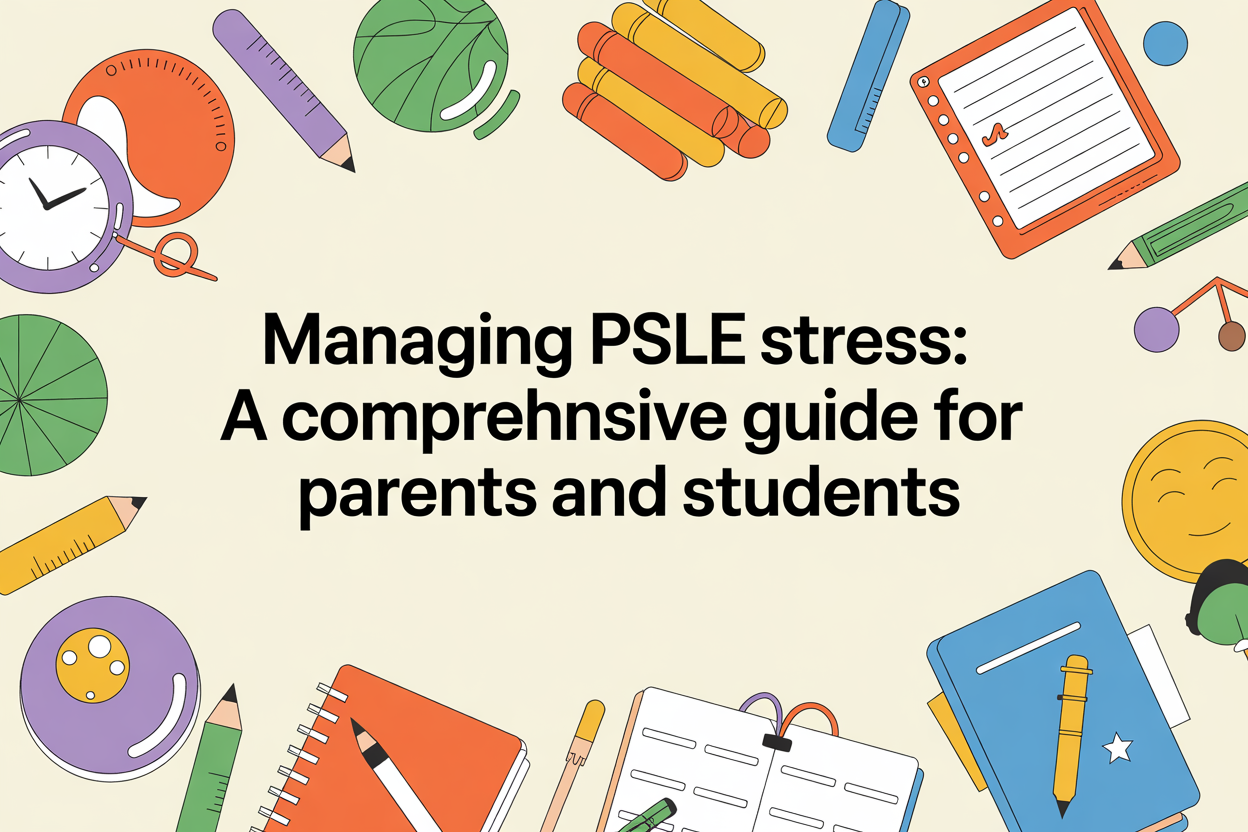- May 17, 2025 -
Top 10 Grammar Mistakes Students Make in PSLE English and How to Avoid Them

- Introduction to Grammar Mistakes in PSLE English
- Subject-Verb Agreement Errors
- Tense Consistency Problems
- Article Usage Mistakes
- Preposition Errors
- Pronoun Reference Confusion
- Run-on Sentences and Fragments
- Common Word Confusion
- Punctuation Pitfalls
- How Grammar Affects PSLE English Scoring
- Effective Strategies to Improve Grammar Skills
- How EduFirst Helps Students Master English Grammar
Grammar forms the foundation of effective communication in the English language. For Primary 6 students preparing for the PSLE English examination, mastering grammar rules isn’t just about scoring well—it’s about developing language skills that will serve them throughout their academic journey and beyond. Yet year after year, examiners report seeing the same grammar mistakes appearing in student papers, costing valuable marks that could make the difference between grade bands.
At EduFirst Learning Centre, our experienced English teachers have identified patterns in the most common grammar errors that Singapore students make during their PSLE examinations. Understanding these mistakes is the first step toward avoiding them. Whether your child struggles with subject-verb agreement or frequently mixes up tenses, recognizing these patterns can significantly improve their writing and comprehension skills.
This comprehensive guide explores the top grammar mistakes that PSLE students make, explains why these errors occur, and provides practical strategies to overcome them. By addressing these common pitfalls, students can enhance their grammar proficiency and approach the PSLE English paper with greater confidence.
1. Subject-Verb Agreement Errors
Subject-verb agreement errors occur when the subject and verb in a sentence don’t match in number. This is one of the most common mistakes PSLE examiners encounter in student compositions and comprehension answers.
Why Students Make This Mistake
Many students understand the basic rule that singular subjects take singular verbs, and plural subjects take plural verbs. However, they often become confused when:
Complex subjects appear between the main subject and verb. For example, in the sentence “The box of chocolates were on the table,” students incorrectly match the verb to “chocolates” rather than the actual subject “box.”
Collective nouns create uncertainty. Words like “team,” “class,” or “group” can be treated as either singular or plural depending on context, causing confusion for students.
Correct Examples
Incorrect: The group of boys were playing in the field.
Correct: The group of boys was playing in the field.
Incorrect: Neither of the students have completed their homework.
Correct: Neither of the students has completed their homework.
2. Tense Consistency Problems
Maintaining consistent tenses throughout a piece of writing proves challenging for many PSLE candidates. Tense shifts can confuse readers and indicate a lack of clarity in thinking.
Common Tense Shifting Issues
Students often begin writing in past tense, then inadvertently switch to present tense mid-paragraph. This frequently happens during narrative writing when describing action sequences or when recounting personal experiences.
Consider this example from a student’s composition:
Incorrect: “Yesterday, I went to the playground. I see my friends there and we are playing on the swings.”
Correct: “Yesterday, I went to the playground. I saw my friends there and we played on the swings.”
When writing narratives, students should decide on a primary tense and maintain it throughout, except when deliberately shifting tense for effect or to indicate different time periods.
3. Article Usage Mistakes
Articles (a, an, the) often create difficulties for Singapore students, particularly those who speak languages at home that don’t use articles in the same way English does.
Types of Article Errors
The three main article mistakes include:
1. Omitting necessary articles: “I went to library” instead of “I went to the library.”
2. Using articles unnecessarily: “The Singapore is a beautiful country” instead of “Singapore is a beautiful country.”
3. Selecting the wrong article: “I saw an unique bird” instead of “I saw a unique bird.”
Remember that “a” is used before consonant sounds, while “an” is used before vowel sounds (not just vowel letters). “The” is used for specific nouns the reader can identify.
4. Preposition Errors
Prepositions (in, on, at, by, with, for, etc.) connect nouns, pronouns, and phrases to other words in a sentence. Using the wrong preposition is a subtle but significant error in PSLE English writing.
Preposition Problem Areas
Students often misuse prepositions in these contexts:
Time expressions: “We will meet in Monday” instead of “We will meet on Monday.”
Place descriptions: “My book is on the table in the kitchen” (correct usage showing how prepositions can work together).
Fixed expressions: Phrases like “afraid of,” “good at,” and “interested in” have specific prepositions that must be memorized.
The challenge with prepositions is that their correct usage often doesn’t follow logical rules and must be learned through reading and practice.
5. Pronoun Reference Confusion
Clear pronoun references are essential for writing clarity. PSLE markers frequently note instances where students use pronouns (he, she, it, they, this, that, etc.) without clearly establishing what or whom the pronoun refers to.
Ambiguous Pronoun References
Consider this confusing example:
Unclear: “John told Peter that he had won the competition.”
Who won the competition? John or Peter? The pronoun “he” could refer to either person.
Clear: “John told Peter, ‘You have won the competition.'”
Or: “John told Peter that Peter had won the competition.”
Students should ensure that every pronoun they use has a clear antecedent (the noun the pronoun replaces).
6. Run-on Sentences and Fragments
Proper sentence structure is fundamental to clear writing. Two common structural errors in PSLE compositions are run-on sentences and sentence fragments.
Run-on Sentences
A run-on sentence occurs when two independent clauses are improperly connected:
Incorrect: “I finished my homework I went to play basketball.”
This can be corrected in several ways:
Correct: “I finished my homework. I went to play basketball.”
Correct: “I finished my homework, and I went to play basketball.”
Correct: “After I finished my homework, I went to play basketball.”
Sentence Fragments
Fragments are incomplete sentences missing either a subject, a verb, or both:
Incorrect: “Running to the bus stop.”
Correct: “He was running to the bus stop.”
Both run-ons and fragments can be easily identified by reading compositions aloud and listening for natural pauses and completeness.
7. Common Word Confusion
Homophones (words that sound the same but have different meanings and spellings) and commonly confused word pairs frequently trip up PSLE students.
Frequently Confused Word Pairs
The most common confusions include:
– Their/There/They’re
– Your/You’re
– Its/It’s
– To/Too/Two
– Accept/Except
– Affect/Effect
– Weather/Whether
– Lose/Loose
These errors often occur because students write words as they sound, without considering their specific meanings. For example:
Incorrect: “They’re books were left in they’re classroom.”
Correct: “Their books were left in their classroom.”
Learning the distinct meanings and creating memory aids can help students avoid these common errors.
8. Punctuation Pitfalls
Proper punctuation helps readers understand the intended meaning of sentences. In PSLE compositions, certain punctuation errors appear consistently.
Common Punctuation Mistakes
1. Comma splices: Using only a comma to join two independent clauses.
Incorrect: “The rain was heavy, we could not go to the park.”
Correct: “The rain was heavy, so we could not go to the park.”
2. Apostrophe errors: Misusing apostrophes for possessives and contractions.
Incorrect: “The boys’s bags” or “Its going to rain.”
Correct: “The boys’ bags” and “It’s going to rain.”
3. Missing quotation marks: Forgetting to use quotation marks for direct speech.
Incorrect: “Help me! shouted the boy.”
Correct: “Help me!” shouted the boy.
9. How Grammar Affects PSLE English Scoring
The impact of grammar errors on PSLE English scores cannot be overstated. The English examination assesses language use across multiple components:
In Paper 1 (Writing), grammar mistakes directly affect scores in both situational writing and continuous writing components. The marking scheme specifically allocates points for language use, which includes grammar, spelling, and punctuation.
For Paper 2 (Language Use and Comprehension), grammar knowledge is explicitly tested in sections on grammar MCQs, grammar cloze passages, and editing for spelling and grammar.
Even in the Listening Comprehension and Oral Communication components, grammatical accuracy in responses contributes to higher scores.
Students who master grammar fundamentals typically score at least 10-15 marks higher than those who consistently make the errors outlined in this article.
10. Effective Strategies to Improve Grammar Skills
Improving grammar requires consistent practice and awareness. Here are proven strategies that have helped our EduFirst students enhance their grammatical accuracy:
Daily Reading Habit
Regular exposure to well-written texts helps students internalize correct grammar patterns. Encourage your child to read age-appropriate books, newspapers (like the Straits Times Schools section), and quality online articles for at least 30 minutes daily.
Grammar Journal
Have your child maintain a personal grammar journal where they note new rules learned and common mistakes they make. Reviewing this journal regularly reinforces learning and creates awareness of individual error patterns.
Editing Practice
Set aside time for your child to review and edit their own writing. Teaching students to identify their own mistakes is more effective than simply correcting errors for them. The PSLE editing section directly tests this skill.
Grammar Games and Apps
Make grammar practice engaging through educational games and apps designed to reinforce grammar rules. Many quality resources are available online for free or at minimal cost.
11. How EduFirst Helps Students Master English Grammar
At EduFirst Learning Centre, we’ve developed a systematic approach to help primary school students overcome common grammar challenges and excel in PSLE English:
Small Class Advantage
Our small class sizes of just 4-8 students allow our teachers to identify each student’s specific grammar weaknesses and provide targeted intervention. This personalized attention helps students progress faster than in larger class settings where individual needs might be overlooked.
Proven Methodology
EduFirst’s English curriculum incorporates specialized grammar modules that address each of the common error types discussed in this article. Our approach combines explicit grammar instruction with abundant opportunities for application through writing tasks and editing exercises.
Customized Grammar Exercises
Rather than generic worksheets, our students receive customized grammar exercises targeting their specific areas of difficulty. This focused practice leads to more efficient improvement and better retention of grammar rules.
Regular Progress Monitoring
We track each student’s grammar development through regular assessments that identify persistent errors and measure improvement. Parents receive detailed feedback about their child’s grammar progress and areas that need additional support.
With 25 locations across Singapore, EduFirst makes quality English tuition accessible to students islandwide. Our proven track record of helping students achieve significant improvements in their English grammar has made us a trusted name in PSLE preparation since 2010.
Conclusion
Grammar mistakes in PSLE English are common but avoidable with the right guidance and practice. By understanding these top errors—from subject-verb agreement to punctuation pitfalls—students can significantly improve their writing accuracy and boost their examination scores.
Remember that grammar mastery doesn’t happen overnight. It requires consistent effort, regular practice, and quality feedback on areas for improvement. The most successful students approach grammar not as a set of arbitrary rules but as essential tools for clear, effective communication.
At EduFirst Learning Centre, we’ve witnessed countless students transform their grammar weaknesses into strengths through our structured approach and personalized attention. The resulting improvement not only benefits their PSLE scores but establishes language foundations that serve them throughout their academic journey.
If your child struggles with any of the grammar issues highlighted in this article, consider how personalized guidance from experienced teachers could make a difference in their English language development.
Need Help with Your Child’s PSLE English Grammar?
EduFirst Learning Centre offers specialized English programs with small class sizes (4-8 students) to ensure your child receives the personalized attention they need to overcome grammar challenges and excel in PSLE English.
With 25 locations islandwide, there’s an EduFirst centre near you ready to support your child’s learning journey.
Contact us today to schedule a consultation or learn more about our PSLE English preparation programs.


